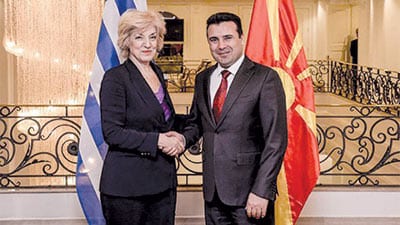We believe that Serbia plays a pivotal role in ensuring the security and stability of the Balkan region and we’re always ready to assist Belgrade in continuing on its reform path
The outcome of the upcoming European elections may have enduring effects on the composition of the European Union and its attitude regarding new entrants. We took the opportunity to discuss these issues with Athanasia Anagnostopoulou, Alternate Minister for Foreign Affairs of Greece.
If right-wing populists win, how will that impact on the overall position of the EU, as an idea, and how will it influence the outcome of Greece’s October elections?
– The European elections, to be held on 26th May, are particularly crucial for Europe and for the future of the European Union itself. Citizens are called upon to decide what kind of Europe they would like. These elections are crucial because citizens are given an opportunity to reject austerity policies or neo-liberal policies. The rise of the far-right across Europe shows that it is time to act.
We can’t afford to say that we didn’t know. For the Greek government, the European elections are not a referendum – as they are for the Nea Demokratia party. The predominance of the extreme right would be a devastating scenario, while it would also be disastrous to see the neoliberal policies promoted by conservative parties actually prevail. What we are proposing to citizens is a broad Progressive Front that is basically a call to fight against austerity and for democracy in Europe.
The Greek government has received very different responses to the Prespa Agreement, both at home and in the EU. What could be the long-term effects of this agreement on the situation in the Western Balkans?
– The signing and, most importantly, entry into force of the Prespa Agreement contribute to the further consolidation of regional stability, security and growth. It serves relations between two neighbouring countries and has a positive impact on regional cooperation and the implementation of significant regional projects. During a difficult period in which good news is something of a rarity, our region showed its ability to produce positive developments and major international achievements.
The Prespa Agreement contributes to the further consolidation of stability, security and growth in the region, and has a positive impact on the implementation of significant regional projects
While many insist that the Prespa Agreement is important for regional security and the progress of the Western Balkan region towards EU accession, do you think the stalemate in the Belgrade-Priština Dialogue could undermine those gains?
– The Governments of the Hellenic Republic and the Republic of North Macedonia have demonstrated political decisiveness and courage to resolve the difficult name issue, which had remained unresolved since the 1990s, and to promote good neighbourly relations in the Southern Balkans. In this respect, the Prespa Agreement contributes to regional security and facilitates Skopje’s European integration process.

We believe that the Balkan Peninsula can be an example of understanding and reciprocity for the whole of Europe.
When it comes to reaching viable solutions in difficult and sensitive long-standing issues, notably those that preoccupy public opinion, political will is always a key precondition and not a panacea. There are also other factors that matter. Any unresolved issue has its own parameters, characteristics and particularities.
In your opinion, who or what could help bring the two sides back to the negotiating table?
– Greece attaches great importance to the Dialogue between Belgrade and Priština, facilitated by the European Union. We strongly believe that the 2013 Brussels Agreement constitutes a valid framework for the talks between the two parties, with a view to normalising their mutual relations. In this regard, it is in the interests of both Serbia and Kosovo to return to the negotiating table and to work together to achieve sustainable and mutually acceptable solutions.
To this end, Greece – along with the EU – stresses the importance of removing obstacles, namely revoking the customs tariffs imposed on imports to Kosovo from Serbia and Bosnia-Herzegovina that have created the current impasse in the Dialogue. As EU officials have underlined, these tariffs imposed by Priština – which contravene CEFTA and the “spirit” of the Stabilisation and Association Agreement – undermine all the good work done to date and are contrary to the principles of regional cooperation. Furthermore, I would like to note that tariffs also affect Greek companies, as well as other European exports from Serbia and Bosnia-Herzegovina.
The Prespa Agreement contributes to the further consolidation of stability, security and growth in the region, and has a positive impact on the implementation of significant regional projects
How do you see Greece’s role in the region, particularly when it comes to the EU accession of the Western Balkan states, including Serbia?
– While recovering from an economic crisis, my country plays an increasingly active role in Southeast Europe and has again emerged as an important regional player.
This new role is demonstrated not only by the signing of the Prespa Agreement, which constitutes a milestone with regard to the resolving of bilateral issues in the region but also by our participation in multilateral cooperation schemes. On Greece’s initiative, five multilateral cooperation schemes have been formed in Southeast Europe, with the aim of enhancing cooperation and coordination among the participating countries on matters of mutual interest or concern arising in the region: Greece-Bulgaria- Romania-Serbia, Greece-Bulgaria- Serbia, Greece-Bulgaria-Romania, Greece-Bulgaria-Romania-Croatia and Greece-Albania-North Macedonia-Bulgaria. These regional cooperation formats have proven useful for regular exchanges of views on common challenges and opportunities in Southeast Europe.
 Greece is one of the oldest members of the European Union and has long been a supporter of the European integration of the Western Balkans, of course under the set conditions. We have demonstrated this support in all of our presidencies of the Council of the EU. In particular, I would like to stress that it was under the Hellenic Presidency of 2003, during the Thessaloniki Summit, that the European Council set the Western Balkans as a priority of EU enlargement.
Greece is one of the oldest members of the European Union and has long been a supporter of the European integration of the Western Balkans, of course under the set conditions. We have demonstrated this support in all of our presidencies of the Council of the EU. In particular, I would like to stress that it was under the Hellenic Presidency of 2003, during the Thessaloniki Summit, that the European Council set the Western Balkans as a priority of EU enlargement.
Regarding Serbia’s European accession prospects, the Hellenic Republic has supported it consistently in every way possible, as we believe that Serbia plays a pivotal role in ensuring security and stability in the Balkan region, and it is important that EU accession remains a top priority for the country. The government and people of Serbia demonstrate their strong commitment to the country’s EU membership bid. In this context, we commend Serbia for the continuing progress that has led to the opening of 16 Accession Negotiation Chapters and we are always ready to assist Belgrade in continuing its reform path, also through the Memorandum of Understanding on the acceleration of Serbia’s EU integration process that was signed between Greece and Serbia in 2010. This MoU provides a wide range of tools for cooperation between our two countries and constitutes a good foundation upon which the two sides can further build.
To what extent did austerity measures in Greece, as well as the economic turmoil faced by the country, impact negatively on the country’s position in the international arena and closer to home in the Western Balkans, where Turkey is increasingly active in politics and economics?
– Greece has definitely turned to a new page. In the course of its recovery from the economic crisis, the country’s historic exit from the memoranda that took place last August constitutes a benchmark. Greece is now a positive pan-European example, the sacrifices of the Greek people have been acknowledged, along with the fact that mistakes were made on the part of institutions. But all of that belongs to the past. It is significant that Greece has already initiated procedures to request the partial early repayment of debt to the IMF – a process that proves that international credibility has been recovered.
As far as the country’s position in our neighbourhood of the Balkans is concerned, the signing of the historic Prespa Agreement has already produced a chain of positive results. The signing of the action plan between Prime Minister Alexis Tsipras and North Macedonia Prime Minister Zoran Zaev, as well as the signing of partial agreements that fulfil long-standing demands of local communities, demonstrate that we are proceeding with the implementation of the agreement in the spirit of consensus for the well-being of citizens.
Greece is fighting for the cause of developing peace, solidarity and mutual support in our Balkan neighbourhood. Greece can play a key role in creating a peaceful European neighbourhood in the Balkans. That is why we are fighting together with all countries in the region that respect international law and European values.
The tariffs imposed by Priština affect Greek companies, as well as other European exports from Serbia and Bosnia-Herzegovina
What are the main diplomatic topics where Greece and Serbia can work together? – Diplomatic relations between Greece and Serbia were established in 1868 and are still excellent. The friendship between Greece and Serbia is one that has endured through time and been reaffirmed again and again throughout history. We are bound by sound religious, historic and economic ties. Greece and Serbia also found themselves in the same alliances during the wars of the last century – a historical fact that enhances mutual trust between our two countries.
We also share a common vision for the future, since Greece – as I have already mentioned previously – is a strong supporter of Serbia’s EU membership.
Greece is situated at the crossroads of three continents and has, since antiquity, connected peoples, goods and cultures. It is for this reason that Greece has long been a strategic transport node for the wider region. Greek ports are strategically located and are being transformed into regional logistics hubs for the transport of goods from Asia to Europe. Serbia also has a significant strategic position in the region. The two countries have acknowledged the added value of strengthening their robust cooperation in all fields even further and have established the High-Level Cooperation Council – the first session of which took place in Thessaloniki in 2017.
 Economic cooperation offers many opportunities for further enhancement of our relations. Tourism constitutes a strong link between the two countries, as Greece is a very popular tourist destination among the Serbian people. I would like to invite Serbian tourists to further explore the whole country and discover new destinations, where they can enjoy the famous Greek hospitality. Greece would also welcome Serbian investments in the tourism industry, and particularly in the development of synergies in sectors of mutual interest, such as religious/ pilgrimage tourism and ecotourism.
Economic cooperation offers many opportunities for further enhancement of our relations. Tourism constitutes a strong link between the two countries, as Greece is a very popular tourist destination among the Serbian people. I would like to invite Serbian tourists to further explore the whole country and discover new destinations, where they can enjoy the famous Greek hospitality. Greece would also welcome Serbian investments in the tourism industry, and particularly in the development of synergies in sectors of mutual interest, such as religious/ pilgrimage tourism and ecotourism.
Trade, transport, energy, infrastructure, digitalisation and telecommunications are also areas of mutual interest in which there is still plenty of room to upgrade our economic cooperation, e.g. through projects that will enhance interconnectivity within the Western Balkans, as well as with the EU, including through the implementation of infrastructure projects and the provision of services. In this context, I would like to add that Greek companies with rich experience in the sectors of transport infrastructure, consulting and telecommunications can provide their services in the implementation of such projects in the region. Furthermore, there is potential for joint actions in the field of renewable energy and energy efficiency, as well as in the electricity sector.
Moreover, there is room to improve our relations in the fields of culture and education, e.g. by organising joint projects in universities and think-tanks. Additionally, research, technology, biomedicine and organic farming provide significant opportunities to expand our cooperation. What’s more, there is also a lot to be done by capitalising on the opportunities offered by European programmes.
In conclusion, I deem it valuable for us to benefit from the momentum created by the Trilateral and Quadrilateral schemes of cooperation with our neighbours in the region, in which both of our countries have been participating actively.
Moreover, the Prespa Agreement, as a historic development not only for the two countries involved but for the entire region, provides ample space for the evolution of bilateral cooperation between the Hellenic Republic and the Republic of North Macedonia, which will be enhanced significantly, and indeed important opportunities for a trilateral Greece- Serbia-North Macedonia cooperative format, mainly on issues of interconnectivity (road, rail, digital), police and civil protection cooperation, including through the transfers of know-how.
| PROPOSITION
What we are proposing to citizens is a broad Progressive Front that is basically a call for a struggle against austerity and for democracy in Europe |
MISSION
Greece is fighting for the development of peace, solidarity and mutual support in our Balkan neighbourhood |
OPPORTUNITY
Trade, transport, energy, infrastructure, digitalisation and telecommunications are areas where there is still plenty of room for upgrading |
|---|